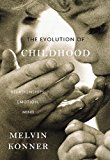
"Nothing in biology makes sense except in the light of evolution," wrote Dobzhansky. In this remarkable book, Melvin Konner shows that nothing in childhood makes sense except in the light of evolution.
This book is an intellectual tour de force: a comprehensive Darwinian interpretation of human development. Looking at the entire range of human evolutionary history, Melvin Konner tells the compelling and complex story of how cross-cultural and universal characteristics of our growth from infancy to adolescence became rooted in genetically inherited characteristics of the human brain.
All study of our evolution starts with one simple truth: human beings take an extraordinarily long time to grow up. What does this extended period of dependency have to do with human brain growth and social interactions? And why is play a sign of cognitive complexity, and a spur for cultural evolution? As Konner explores these questions, and topics ranging from bipedal walking to incest taboos, he firmly lays the foundations of psychology in biology.
As his book eloquently explains, human learning and the greatest human intellectual accomplishments are rooted in our inherited capacity for attachments to each other. In our love of those we learn from, we find our way as individuals and as a species. Never before has this intersection of the biology and psychology of childhood been so brilliantly described.
This book is an intellectual tour de force: a comprehensive Darwinian interpretation of human development. Looking at the entire range of human evolutionary history, Melvin Konner tells the compelling and complex story of how cross-cultural and universal characteristics of our growth from infancy to adolescence became rooted in genetically inherited characteristics of the human brain.
All study of our evolution starts with one simple truth: human beings take an extraordinarily long time to grow up. What does this extended period of dependency have to do with human brain growth and social interactions? And why is play a sign of cognitive complexity, and a spur for cultural evolution? As Konner explores these questions, and topics ranging from bipedal walking to incest taboos, he firmly lays the foundations of psychology in biology.
As his book eloquently explains, human learning and the greatest human intellectual accomplishments are rooted in our inherited capacity for attachments to each other. In our love of those we learn from, we find our way as individuals and as a species. Never before has this intersection of the biology and psychology of childhood been so brilliantly described.








Recent Comments